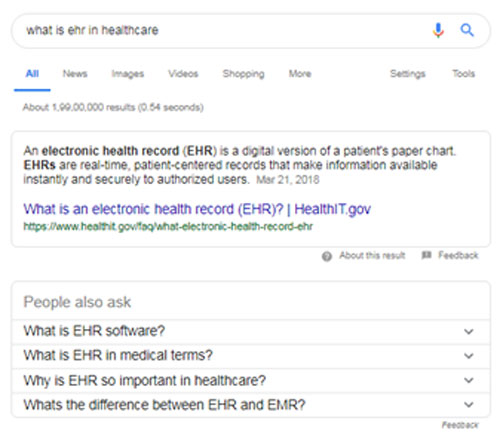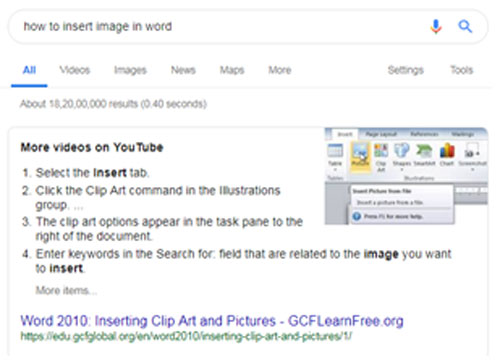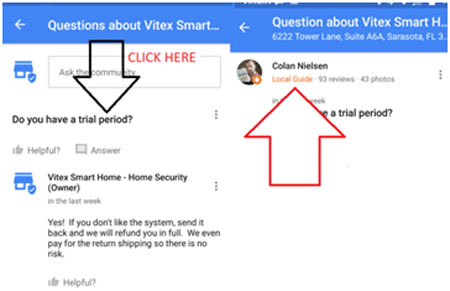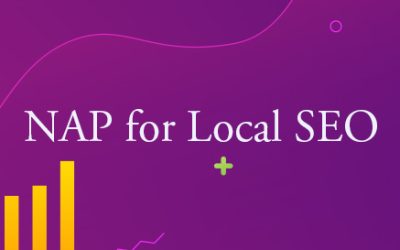“The only way to win at content marketing is for the reader to say, ‘This was written specifically for me.” – Jamie Turner, an internationally-recognized author
While content writing plays a key role in today’s digital marketing, writing a lot of content and posting it without knowing your reader’s requirement makes no sense at all. This is where semantic SEO comes in. It’s about satisfying the search intent of your visitors by providing relevant content that unambiguously answers specific user intent.
The rise in voice searches is also making it more important to write content that answers searchers’ questions. Being a semantic search engine, Google determines search intent and connects searcher’s questions to the most relevant content that answers that search query. Answering your readers’ questions with perfect content that provides them the right information is the ideal way to reach them.

Google now offers
One-box “instant answers” between the search box and the search results and “People also ask,” featuring questions and answers other people had when typing a similar query.

Question optimization allows
- understanding natural language better
- optimizing for voice search
- increasing organic search visibility through featured snippets and Google’s “People Also Ask” results
Readers may have a question, or would like to buy something or may be even searching for a specific website, but all needs a suitable answer.
Primary types of queries that define search intent include
Basic – With such questions, readers will be seeking quick and easy-to-understand answers, such as “What is my IP address?”
How to – Readers will be expecting answers that provide step-by-step instructions on completing a process, like “How to insert image in word?” It would be great if you could add videos to better explain the process.

Branded – Such questions usually include your or your competitor’s brand name or a product name, like “What is the use of SAP software?”
High-intent – These questions will be related to how to buy or use your product, such as “How much does SAP software cost?”
Navigational – Navigational searches include a specific website, brand, or business name, “How to login to SAP?”
To optimize content for branded and navigational questions, make consumers become familiar with your brand by listing your business on all the major online business directories such as Yelp and Yellow Pages, updating Google My Business page, optimizing your social media profiles by including your business name, description, and providing a link to your website and including your company name on product pages. Also, you can encourage employees to update their social profiles with company details and website links.
Keep track of Google Q&A
Google Map’s Q&A section is also an ideal way to represent your own business online. Like reviews, Google’s Q&As have the potential to build your reputation online. A variety of questions and thorough, high-quality answers on your page can boost your business’ professionalism and trustworthiness in the eyes of customers. However, this feature is available only for Android and iOS devices, but not for desktop users.

(Source https://searchengineland.com/6-things-need-know-googles-qa-feature-google-maps-281255)
If customers haven’t asked many questions, write up a list of questions and provide helpful answers to those questions. While posting these answers, make sure you’re signed into your Google My Business account, so that Google will mark your answers as being from the business owner.
Remember that this Q&A feature is not a promotional tool for businesses – it’s designed to help customers. Answer customers’ questions as soon as possible. As this feature uses an upvoting system, earlier answers are more likely to be displayed. To prevent any sort of mischief in your Q&A feature, never answer a question with just a “yes” or “no”, as users can edit the questions they asked after the fact. Instead, provide a complete, detailed answer that satisfies your customer. Phrase your questions and answers in plain English, and avoid any technical jargon that casual visitors might not be familiar with.
Optimize Content with a FAQ Page

(https://www.hqbk.com/mri-faq.htm)
Along with optimizing content for Google Featured Snippets, you can also improve search with a FAQ page on your website. On this page, consider answering key questions your audience wants answers for. An FAQ page with timely questions can add value to your overall user experience. Answering critical questions not only assists your audience, but also helps your search engine optimization because search engines view sites that give satisfying answers as more valuable. There are also increased chances for Google to draw snippable content from your FAQ page, like this:

Keyword stuffing no longer helps content rank in organic search. Make sure to check for proper long-tail keywords. Certain tools that help in keyword research based on searcher intent include Google’s Keyword Planner, Moz’s Keyword Explorer, SEMrush, Buzzsumo, Ahrefs, MarketMuse and HitTail.
So, solid information is the key. By making questions and informative answers a major part of your content marketing strategy, you get an opportunity to generate more exposure from search results, build trust, and become a valuable resource. Make sure to feature your answers on sites like Quora, which is a great resource for questions on any topic. Monitor questions on social media sites to see what real people are asking in real time. Also, incorporate SEO strategies that can increase your chances to show up in voice results.




